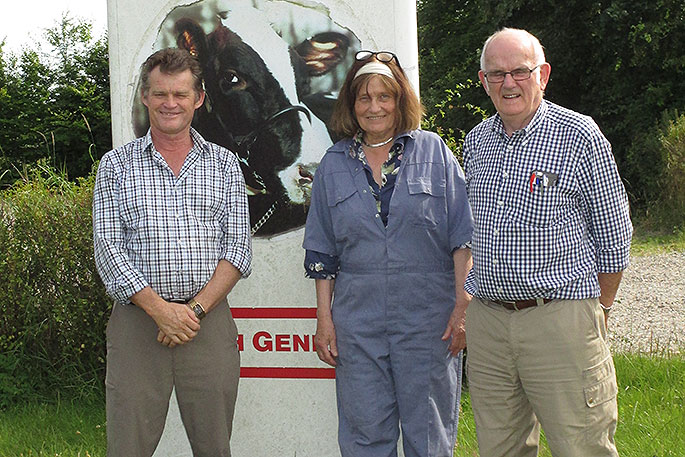The Ministry for Primary Industry's current focus is not on treating the cow disease Mycoplasma Bovis, but on minimising its spread, says the ministry's incident controller Stephen Bell.
There's no evidence of a cure for the disease, which has affected dairy cow herds in eight South Canterbury farms, he has told SunLive.
Former dairy farmer and Forward Farming Biological Consultancy managing director David Law believes he knows the cause of the devastating disease and may also have a cure, but says he is not being taken seriously by MPI.
David first volunteered internationally-recognised disease information to MPI in October, three months after the first cases of M. Bovis appeared in Oamaru, but says the ministry has failed to act on it.
'Since then, more farms have tested positive for M. Bovis,” David says.
'We have a product designed to kill anaerobic bacteria, and we think it could really help. Meanwhile, MPI is culling cows with a gestapo-type attitude.”
So far around 5000 cows have been culled and eight farms in South Canterbury are confirmed as having the infection in their herds.
Stephen says MPI makes decisions based on a body of scientific evidence.
'There is no evidence of a cure for M.bovis and all international evidence shows that this is a disease which primarily spreads by direct nose-to-nose contact and by contact with body fluids such as mucus and milk.
'Our current focus is not on treating this disease. This whole operation is about managing the disease while keeping our future options open.
'We want to minimise the risk of further spread of the disease. Moving ahead with depopulation of the affected farms will allow them to get back to normal business as soon as it is safe to do so,” he says.
David bases his claims on what he learned while attending a series of biological farming seminars as guest speaker in England in January. It was then that he met Jorn Erri, a Danish veterinarian specialising in anaerobic pathogenic diseases. David revisited Erri in July.
'Since meeting Jorn, I don't believe M. Bovis is the result of a contagious disease, but rather of a particular farming system – and the irrigation of anaerobic effluent to pasture is the beginning of it.”
David says understanding the makeup of effluent is key: an anaerobic effluent pond, with a pH below 7, is crusted and sludgy and harbours bad pathogenic bacteria, whereas an aerobic pond, with a pH over 7, is clearer of crust and sludge and contains healthy aerobic bugs.
'The bacteria which enjoy the particular condition dominate, and effluent, good or bad, is irrigated to pasture.
'In other areas of the world where M. Bovis is more prevalent, farmers follow similar systems. In Germany, they no longer irrigate anaerobic effluent to pasture after hundreds of cows infected with M. Bovis had to be slaughtered.”
David believes MPI needs to look seriously at the information he has provided before more farms are devastated.
'Killing cows is only killing the symptoms. The pathway which I believe has a starting point can easily be tested and verified. M. Bovis is enjoying a particular set of conditions which is allowing it to flourish.
'Our team informed the latest farmers affected that we had a possible treatment to put to the test, but anything new needs MPI approval. MPI is not winning any friends with its attitude, and I feel helpless when I believe we could help.
'Killing herds of well-bred cows won't change these conditions, but will certainly guarantee that the disease is not going away.”
Mycoplasma bovis is a bacterium that causes illness in cattle, including udder infection (mastitis), abortion, pneumonia, and arthritis. It does not infect humans and presents no food safety risk.
Mycoplasma bovis is common internationally and is present in most countries with animal production industries. It is not listed with the OIE (the world animal health organisation). It does not present a trade risk for New Zealand animal products.
This is the first time it has been found in New Zealand. The bacterium is an Unwanted Organism under the Biosecurity Act 1993.



1 comment
I remember when...
Posted on 08-12-2017 14:17 | By morepork
...Bovine Encephalitis (mad cow disease) was first encountered in the UK. The "party line" was: "It does not infect humans and presents no food safety risk." Until it did, and people started dying from it (156 people in the 1990s; 177 to date), all British beef exports were banned and more than 4.5 million animals were slaughtered. (Imagine what that would do to NZ...) I further remember several years of eating NZ lamb, chicken, venison and goat, with no sign of beef on the table... It is short-sighted and foolish in the extreme to not at least TRY a possible solution from a man who has researched the problem and interacted with farmers in other countries who also face it. The MPI position is understandable and probably correct, but while limiting the spread, would it hurt to try for a cure?
Leave a Comment
You must be logged in to make a comment.